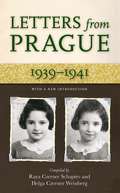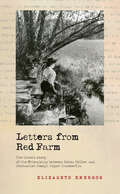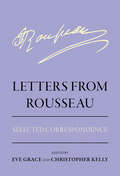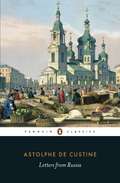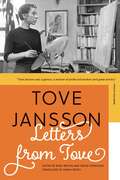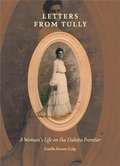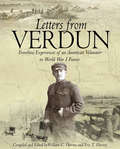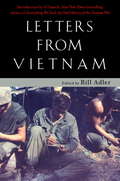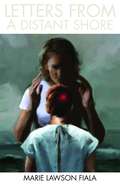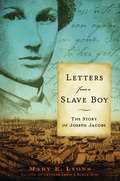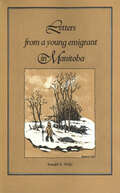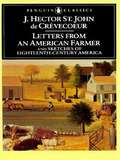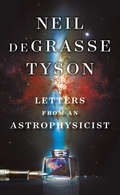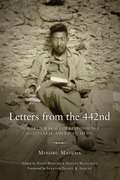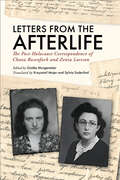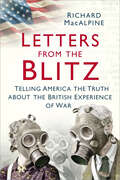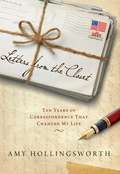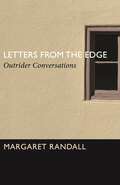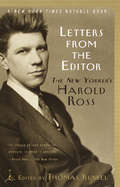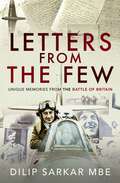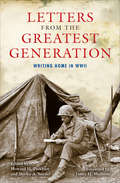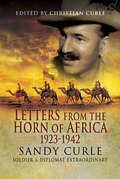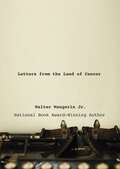- Table View
- List View
Letters from Prague: 1939–1941
by Helga Weinberg Raya C SchapiroCorrespondence documenting a Jewish family&’s personal history of the Holocaust and World War II. Raya Schapiro and Helga Weinberg found a box of letters among their mother&’s effects after her death in 1990. They were written by their grandmother and uncle, trapped in Prague after the Nazi occupation, to the girls&’ parents who had escaped to the United States in May, 1939, leaving behind Raya and Helga, who were five and seven years old at the time. The seventy-seven letters reprinted here span a period of two years, during which the Nazis drew an ever-tightening noose of destruction around the Jews of Prague: each letter is followed by notes of explanation and amplification, as well as notes on Nazi laws and official restrictions and the progress of the war. Each letter has a censor&’s stamp on it; each envelope bears the still-frightening emblem of the Third Reich. The letters dramatically convey the tension, growing daily, of existence under the Nazis, and their tone becomes increasingly desperate as every avenue of escape reaches a dead end. Praise forLetters from Prague: 1939–1941&“This book turns an abstraction into a palpable terror and pity.&” —Chicago Tribune&“A compelling and personal insight into the horrors of the Holocaust.&” —Booklist&“As it turned out, the girls escaped only after months of bureaucratic wrangling, while the grandmother and uncle never obtained permission to leave and were deported to the gas chambers at Treblinka and Auschwitz two years later. Collected here is the moving correspondence between the adults in Prague and the girls&’ parents in the U.S.&” —Publishers Weekly
Letters from Red Farm: The Untold Story of the Friendship between Helen Keller and Journalist Joseph Edgar Chamberlin
by Elizabeth EmersonIn 1888, young Helen Keller traveled to Boston with her teacher, Annie Sullivan, where they met a man who would change her life: Boston Transcript columnist and editor Joseph Edgar Chamberlin. Throughout her childhood and young adult years, Keller spent weekends and holidays at Red Farm, the Chamberlins' home in Wrentham, Massachusetts, a bustling environment where avant-garde writers, intellectuals, and social reformers of the day congregated. Keller eventually called Red Farm home for a year when she was sixteen. Informed by previously unpublished letters and extensive research, Letters from Red Farm explores for the first time Keller's deep and enduring friendship with the man who became her literary mentor and friend for over forty years. Written by Chamberlin's great-great granddaughter, this engaging story imparts new insights into Keller's life and personality, introduces the irresistible Chamberlin to a modern public, and follows Keller's burgeoning interest in social activism, as she took up the causes of disability rights, women's issues, and pacifism.
Letters from Rousseau: Selected Correspondence (Agora Editions)
by Eve Grace Christopher KellyLetters from Rousseau is the first extensive collection of translations of Rousseau's correspondence into English in more than eighty years. Many of the letters have not been translated before, while others address substantive issues in his thought and complement his published writings. Although these letters went through the post as ordinary letters, once Rousseau became famous, he knew that they might be opened by the police and that they were very likely to be circulated and even published. Indeed, he wrote some of them with a view to their ultimate publication.Rousseau's enormous "private" correspondence extends into all periods of his life, including intimate letters to friends, letters to famous individuals, and responses to readers who posed philosophic questions to him. Thus, Eve Grace and Christopher Kelly also share his responses to readers who had been moved by his books. Further, this volume includes letters written to or about major intellectual figures, such as Diderot, Voltaire, Hume, and Mirabeau.
Letters from Russia
by Marquis de CustineThe Marquis de Custine's unique perspective on a vast, fascinating country in the grip of oppressive tyrannyIn 1839, encouraged by his friend Balzac, Custine set out to explore Russia. His impressions turned into what is perhaps the greatest and most influential of all books about Russia under the Tsars. Rich in anecdotes as much about the court of Tsar Nicholas as the streets of St Petersburg, Custine is as brilliant writing about the Kremlin as he is about the great northern landscapes. An immediate bestseller on publication, Custine's book is also a central book for any discussion of 19th century history, as - like de Tocqueville's Democracy in America - it dramatizes far broader questions about the nature of government and society.
Letters from Tove
by Tove JanssonA virtual memoir in letters by the beloved creator of the Moomins Tove Jansson&’s works, even her famed Moomin books, fairly teem with letters of one kind or another, from messages bobbing in bottles to whole epistolary novels. Fortunately for her countless readers, her life was no different, unfolding as it did in the letters to family, friends, and lovers that make up this volume, a veritable autobiography over the course of six decades—and the only one Jansson ever wrote. And just as letters carry a weight of significance in Jansson&’s writing, those she wrote throughout her life reflect the gravity of her circumstances, the depth of her thoughts and feelings, and the critical moments of humor, sadness, and grace that mark an artist&’s days.These letters, penned with characteristic insight and wit, provide an almost seamless commentary on Jansson&’s life within Helsinki&’s bohemian circles and on her island home. Shifting between hope and despair, yearning and happiness, they describe her immersion in art studies and her ascension to fame with the Moomins. They speak frankly of friendship and love, loneliness and solidarity, and also of politics, art, literature, and society. They summon a particular place and time reflected through a mind finely attuned to her culture, her world, and her own nature—all clearly put into biographical and historical context by the volume&’s editors, both longtime friends of Tove Jansson—and, in the end, draw a complex, intimate self-portrait of one of the world&’s most beloved authors.
Letters from Tully: A Woman's Life on the Dakota Frontier
by Estella Bowen CulpA collection of letters from a woman pioneer in South Dakota in early 1900s.
Letters from Verdun: Frontline Experiences of an American Volunteer in World War I France
by Avery Royce WolfeThe dramatic experiences of an ambulance driver in the Great War, told through personal correspondence and photographs. Though the United States was late to enter the Great War, a number of idealistic young Americans wished to take part from the beginning. One of these was Avery Royce Wolf, a highly educated scion of a family in America&’s burgeoning industrial heartland. Volunteering as an ambulance driver with the French Army in the Verdun sector, Royce sent back a constant stream of highly detailed letters describing the experience of frontline combat, as well as comments on strategy, the country he encountered, and the Allies&’ prospects for success. This treasure trove of brilliant letters, only recently discovered, is accompanied by several albums worth of rare, high-quality photos depicting aspects of the Great War in France never previously published. Full of action, including the suspense and terror of the Ludendorff Offensive, and interesting firsthand analyses, such as comparing French and German trench works, Letters from Verdun brings the reader amazingly close to the frontlines of the Great War.
Letters from Vietnam
by Bill Adler"No heroes, everyone did their part, and everyone was scared to death." They are the words of soldier Mark W. Harms in 1968, summing up his combat experience during the Vietnam War. His stunning letter home is just one of hundreds featured in this unforgettable collection, Letters from Vietnam. In these affecting pages are the unadorned voices of men and women who fought--and, in some cases, fell--in America's most controversial war. They bring new insights and imagery to a conflict that still haunts our hearts, consciences, and the conduct of our foreign policy. Here are the early days of the fight, when adopting a kitten, finding gold in a stream, or helping a local woman give birth were moments of beauty amid the brutality ... shattering first-person accounts of firefights, ambushes, and bombings ("I know I will never be the same Joe."--Marine Joe Pais) ... and thoughtful, pained reflections on the purpose and progress of the entire Southeastern Asian cause ("All these lies about how we're winning and what a great job we're doing ... It's just not the same as WWII or the Korean War." --Lt. John S. Taylor.) Here, too, are letters as vivid as scenes from a film--Brenda Rodgers's description of her wedding to a soldier on the steps of Saigon City Hall ... Airman First Class Frank Pilson's recollection of President Johnson's ceremonial dinner with the troops ("He looks tired and worn out--his is not an easy job") ... and, perhaps most poignant, Emil Spadafora's beseeching of his mother to help him adopt an orphan who is a village's only survivor ("This boy has nothing, and his future holds nothing for him over here.") From fervent patriotism to awakening opposition, Letters from Vietnam captures the unmistakable echoes of this earlier era, as well as timeless expressions of hope, horror, fear, and faith.
Letters from a Distant Shore
by Marie Lawson FialaTragedy shattered Marie Lawson Fiala's life as wife, mother and lawyer when her 13-year old son, Jeremy, was felled by a massive hemorrhage from a ruptured artery deep in his brain. Within an hour, Jeremy was in a coma, sustained only by machines. This memoir of a mother's ferocious care, devastating loss and prayerful transcendence focuses on bringing her son back from the edge. The suspense is relentless and the author's observations as sharp as a scalpel.
Letters from a Slave Boy
by Mary E. LyonsLike his mother and grandmother before him, Joseph Jacobs was born into slavery. Joseph lives with his grandmother and sister in North Carolina, but he has not seen his mother for more than seven years. Unbeknownst to Joseph, his mother, Harriet, has been hiding from her owner in the attic of the house that Joseph lives in. But when Harriet's hiding place is in danger of being revealed, she is forced to flee north to safety only moments after being reunited with her family.Devastated by losing his mother for the second time, Joseph begins to ponder the nature of the world he lives in. Soon Joseph, seeking freedom and a place where he can be himself, follows his mother north. As he searches for answers, Joseph experiences life in Massachusetts, California, Australia, and aboard a whaling ship--but there's no place where Joseph feels that he can truly be free.In this companion novel to Letters from a Slave Girl, Joseph's stirring quest for freedom and identity is told through letters imagined by the author. Based on the real-life stories of Harriet and Joseph Jacobs, Letters from a Slave Boy is set against the backdrop of some of the most exciting and turbulent times in American history.
Letters from a Slave Boy: The Story of Joseph Jacobs
by Mary E. LyonsLike his mother and grandmother before him, Joseph Jacobs was born into slavery. Joseph lives with his grandmother and sister in North Carolina, but he has not seen his mother for more than seven years. Unbeknownst to Joseph, his mother, Harriet, has been hiding from her owner in the attic of the house that Joseph lives in. But when Harriet's hiding place is in danger of being revealed, she is forced to flee north to safety only moments after being reunited with her family.Devastated by losing his mother for the second time, Joseph begins to ponder the nature of the world he lives in. Soon Joseph, seeking freedom and a place where he can be himself, follows his mother north. As he searches for answers, Joseph experiences life in Massachusetts, California, Australia, and aboard a whaling ship--but there's no place where Joseph feels that he can truly be free.In this companion novel to Letters from a Slave Girl, Joseph's stirring quest for freedom and identity is told through letters imagined by the author. Based on the real-life stories of Harriet and Joseph Jacobs, Letters from a Slave Boy is set against the backdrop of some of the most exciting and turbulent times in American history.
Letters from a Young Emigrant in Manitoba
by Norman SchmidtLetters from a Young Emigrant in Manitoba first published in 1883 and long out of print, is one of the best records of Canadian immigrant life. The letters were written by Edward ffolkes, who left England in 1880 to study at the Ontario Agricultural College in Guelph and later to homestead in southern Manitoba. They describe with rare insight the daily struggles and expectations of an “ordinary” man who had the courage to take up a new life on the frontier. Ronald A. Wells has introduced the volume with a wide-ranging essay on the role of popular knowledge about Canada in Britain and the significant shift of British migration from the United States for Canada at the end of the nineteenth century. This edition has been designed in the style of the original, with the addition of Norman Schmidt’s evocative line drawings.
Letters from an American Farmer and Sketches of Eighteenth-Century Ameri
by J. Hector Crevecoeur Albert E. StoneAmerica's physical and cultural landscape is captured in these two classics of American history. Letters provides an invaluable view of the pre-Revolutionary and Revolutionary eras; Sketches details in vivid prose the physical setting in which American settlers created their history.
Letters from an Astrophysicist
by Neil DeGrasse TysonA luminous companion to the phenomenal bestseller Astrophysics for People in a Hurry. <P><P>Astrophysicist Neil deGrasse Tyson has attracted one of the world’s largest online followings with his fascinating, widely accessible insights into science and our universe. Now, Tyson invites us to go behind the scenes of his public fame by revealing his correspondence with people across the globe who have sought him out in search of answers. In this hand-picked collection of 101 letters, Tyson draws upon cosmic perspectives to address a vast array of questions about science, faith, philosophy, life, and of course, Pluto. His succinct, opinionated, passionate, and often funny responses reflect his popularity and standing as a leading educator. <P><P>Tyson’s 2017 bestseller Astrophysics for People in a Hurry offered more than one million readers an insightful and accessible understanding of the universe. Tyson’s most candid and heartfelt writing yet, Letters from an Astrophysicist introduces us to a newly personal dimension of Tyson’s quest to explore our place in the cosmos. <P><P><b>A New York Times Bestseller</b>
Letters from the 442nd: The World War II Correspondence of a Japanese American Medic (The Scott and Laurie Oki Series in Asian American Studies)
by Minoru MasudaThis is the first collection of letters by a member of the celebrated 442nd Combat Team, which served in Italy and France during World War II. Written to his wife by a medic serving with the segregated Japanese American unit, the letters describe a soldier’s daily life. Minoru Masuda was born and raised in Seattle. In 1939 he earned a master’s degree in pharmacology and married Hana Koriyama. Two years later the Japanese struck Pearl Harbor, and Min and Hana were imprisoned along with thousands of other Japanese Americans. When the Army recruited in the relocation camp, Masuda chose to serve in the 442nd. In April 1944 the unit was shipped overseas. They fought in Italy and in France, where they liberated Bruyeres and rescued a “lost battalion” that had been cut off by the Germans. After the German surrender on May 3, 1945, Masuda was among the last of the original volunteers to leave Europe; he arrived home on New Year’s Eve 1945. Masuda’s vivid and lively letters emphasize his surroundings, his daily activities, and the people he encountered. He describes Italian farmhouses, olive groves, and avenues of cypress trees; he writes of learning to play the ukulele with his “big, clumsy” fingers, and the nightly singing and bull sessions which continued throughout the war; he relates the plight of the Italians who scavenged the 44 2nd’s garbage for food, and the mischief of French children who pelted the medics with snowballs. Minoru Masuda was professor of psychiatry at the University of Washington. Hana Masuda was Minoru’s wife. Dianne Bridgman is the former manager of the Washington State Oral History Program.
Letters from the Afterlife: The Post-Holocaust Correspondence of Chava Rosenfarb and Zenia Larsson
by Goldie MorgentalerExtraordinarily little has been written about how women who survived the Holocaust dealt with life after the war, with the trauma of their immediate pasts, and with the debilitating sense of alienation they felt in a changed world. Letters from the Afterlife chronicles the experiences of two female Holocaust survivors as they adjusted to life in their adopted countries of Canada and Sweden, where they knew neither the language nor the culture.Childhood friends in Poland, Chava Rosenfarb and Zenia Larsson lived through the Lodz Ghetto and the death camps together, parting soon after their liberation from Bergen-Belsen. For the next fifty years, they continued their friendship through letters written in Polish, their only shared language. Despite their continuing traumas and insecurities, Rosenfarb and Larsson went on to become distinguished novelists in their respective languages, Yiddish and Swedish. In 1972, Larsson published her own side of the correspondence translated into Swedish, which caused a temporary rift in their enduring friendship.Letters from the Afterlife, with evocative translations by Krzysztof Majer and Sylvia Söderlind, makes these letters available to an English readership. Rosenfarb’s daughter, Goldie Morgentaler, provides an introduction that establishes the importance of the correspondence from both cultural and historical perspectives and an epilogue that continues Rosenfarb and Larsson’s story after their written exchange was abruptly but temporarily suspended in 1971.
Letters from the Blitz: Telling America the Truth about the British Experience of War
by Richard MacAlpineWhen war was declared in September 1939, everyday life for British citizens changed almost overnight. At the time, Winifred Graville of Sheffield, a gardener, writer and speaker well known in her local area, wrote a series of letters to her American cousin in Penn Yan, New York, describing the hardships and typical daily struggles her city experienced during the Blitz. At a time when American public opinion was strictly isolationist, Winifred’s cousin convinced the editor of a local newspaper to publish excerpts from 150 letters in the hope of influencing public opinion in a small way. In Letters from the Blitz, Richard MacAlpine has gathered the published letters into a fascinating collection. At times poignant, often humorous, and always beautifully written and full of detail, Winifred’s letters clearly illustrate the ‘Keep Calm and Carry On’ attitude of the British people during that difficult time and provide an insight into wartime life.
Letters from the Closet: Ten Years of Correspondence That Changed My Life
by Amy HollingsworthAn honest and poignant look into the deeply intimate yet platonic relationship between a gay English teacher and his young female protégée--each seeking connection and acceptance--as reflected by the decade of letters they exchanged.It was an improbable relationship from the start--a high school English teacher, still in the closet, and his best student. From the confines--and protection--of his closet, Amy's teacher wrote these letters, letters that were read, cherished, answered, and then locked away for years. Now Amy looks back at the decade of intimate letters that preceded her teacher's untimely death, collects the shards left by their clumsy, sometimes violent attempts to unmask each other, and counts again the cost of knowing and being known. Every writer needs a room of his own, but for some people, at certain times, and in certain circumstances, the best you can do is a closet. Timely and relevant, this is a love story of the most contemporary kind, a rare glimpse into an intimate relationship between teacher and student--a relationship whose effects are still being felt decades later. It's raw and honest and moving, a poignant commentary on the values that unite us all.
Letters from the Desert
by Carlo CarrettoThis book was originally written as a series of letters to friends. After joining The Little Brothers of Jesus, a community to working and living with the poorest of the poor, the author burned all addresses as kind of renunciation. This is a series of deeply personal meditations springing from his life in the Sahara. They are beautiful prayerful, and intensely human. The book is small, but well worth pondering.
Letters from the Edge: Outrider Conversations
by Margaret RandallBy excerpting from letters she exchanged with five irreverent writers and artists, Margaret Randall constructs conversations that open windows on four pivotal moments in her life and on world events. This correspondence touches on important themes, such as social change, identity, art, and creative integrity—issues that were relevant then and remain so today. The letters are sometimes philosophical, sometimes intimate, and deal with family life as well as major creative projects, including literary political publishing, often taken on against daunting odds. Society continuously tries to subsume or shape influential rebel minds to its interests. Every generation has those who will not allow themselves to be silenced or controlled. This book is exciting evidence of this.Chapters:I.Walter Lowenfels: A Poet Who Laughed at TimeII.Laurette Séjourné: A Woman with Pick and Shovel and Arnaldo Orfila: A Man Who Filled a CenturyIII.Susan Sherman: A Woman Before Her TimeIV.Greg Smith: A Painter Who Listens to Silence
Letters from the Editor: The New Yorker's Harold Ross
by Thomas KunkelThese exhilarating letters--selected and introduced by Thomas Kunkel, who wrote Genius in Disguise, the distinguished Ross biography--tell the dramatic story of the birth of The New Yorker and its precarious early days and years. Ross worries about everything from keeping track of office typewriters to the magazine's role in wartime to the exact questions to be asked for a "Talk of the Town" piece on the song "Happy Birthday." We find Ross, in Kunkel's words, "scolding Henry Luce, lecturing Orson Welles, baiting J. Edgar Hoover, inviting Noel Coward and Ginger Rogers to the circus, wheedling Ernest Hemingway-- offering to sell Harpo Marx a used car and James Cagney a used tractor, and explaining to restaurateur-to-the-stars Dave Chasen, step by step, how to smoke a turkey." These letters from a supreme editor tell in his own words the story of the fierce, lively man who launched the world's most prestigious magazine.From the Hardcover edition.
Letters from the Few: Unique Memories from the Battle of Britain
by Dilip SarkarFascinated by the Battle of Britain from an early age, as a young man Dilip Sarkar realized that recording and sharing the Few’s memories was of paramount importance. At the time, back in the mid-1980s, membership of the Battle of Britain Fighter Association was well populated and the then Honorary Secretary, the now late Wing Commander Pat Hancock DFC, OBE, supported Dilip’s research by forwarding letters to individual pilots of interest. Those members of the Few included a wide-range of personalities, from famous airmen like Group Captain Peter Townsend and Air Marshal Sir Denis Crowley-Milling, to the ‘also rans’, as Battle of Britain Hurricane pilot Peter Fox famously described himself and peers. Indeed, it was Peter’s ‘also rans’ that were of the greatest interest to Dilip, who recognized that whilst many famous and distinguished pilots had either published personal memoirs or had biographies written about them, lesser-lights had no platform to record and share their experiences. This Dilip became dedicated to resolving. For many years, Dilip enjoyed prolific correspondence with the Few. These letters – hundreds of them – now represent a unique primary source, confirming the incredibly close relationship the author enjoyed with his heroes and high esteem in which they likewise held him. Over the years, Dilip’s published work has enormously benefited from his unique knowledge of the people involved through this very personal association, the memories collated providing his books a real ‘human’ touch. As the Few sadly fade away, it is only now that the significance of Dilip’s correspondence, industry and archive arising are becoming truly apparent. In Letters From The Few, Dilip shares with us, for the first time, a small selection of his correspondence with Battle of Britain fighter pilots, providing us an inspirational insight into the immeasurable value of this research and personalities involved.
Letters from the Greatest Generation: Writing Home in WWII
by Howard H. Peckham & Shirley A. SnyderA collection of personal letters from overseas that reveal in day-to-day detail what it was like to serve in World War II. Recounting victory and defeat, love and loss, this is a remarkable and frank collection of World War II letters penned by American men and women serving overseas. Here, the hopes and dreams of the greatest generation fill each page, and their voices ring loud and clear. &“It&’s all part of the game but it&’s bloody and rough,&” writes one soldier to his wife. &“Wearing two stripes now and as proud as an old cat with five kittens,&” remarks another. Yet, as many countries rejoiced on V-E Day, this book reveals that soldiers were &“too tired and sad to celebrate.&” Filled with the everyday thoughts of these fighters, the letters are by turns heartbreaking and amusing, revealing and frightening. While visiting a German concentration camp, one man wrote, &“I don&’t like Army life but I&’m glad we are here to stop these atrocities.&” Meanwhile, in another letter a soldier quips, &“I know lice don&’t crawl so I figured they were fleas.&” A fitting tribute to all veterans, this book brings the experience of war—its dramatic horrors, its dreary hardships, its desperate hope for a better future—to vivid life. &“An intimate portrait of the mundane and remarkable, of heroism and terror, of friendship and loss . . . Timely, compelling, and important reading.&”—Matthew L. Basso, author of Men at Work
Letters from the Horn of Africa, 1923–1942: Sandy Curle, Soldier and Diplomat Extraordinary
by Christian CurleAfter brief service in the Gordon Highlanders as part of the Army of Occupation of the Rhine post Great War, Sandy Curle sought more adventurous soldiering and in 1923 was seconded to the Kings African Rifles (KAR). Aged 23 he found himself in remotest Somaliland in sole charge and the only European for miles. At one point delirious with typhoid he was only saved by the surprise visit of an Indian doctor. Later he served in Kenya and undertook numerous military expeditions.In 1929 Curle joined the Colonial Service again in Somaliland and Ethiopia. He witnessed the Italians aggression which led to their invasion of Ethiopia in 1935. A spell in Tanganyika as a District Officer followed and on the outbreak of war he rejoined the KAR and was attached to the Somaliland Camel Corps when the Italians invaded. Hopelessly outnumbered, Sandy and his men withdrew to Kenya by troopship.His next assignment was to raise, train and command a battalion of Ethiopian irregulars (Curles Irregulars) and with these he led the reoccupation of Ethiopia winning the DSO and Ethiopian Military Medal.In 1966 Curle was one of 25 veterans invited by Emperor Haile Selaise to celebrate the 25th Anniversary of the liberation from Italian rule.This is a vivid and fascinating collection of correspondence covering some 30 years of war and uncertain peace.
Letters from the Land of Cancer
by Walter Wangerin Jr.In Letters from the Land of Cancer Ebook, award-winning writer Walter Wangerin Jr. offers his profound insights into the greatest challenge we face: confronting our own mortality. &“Shortly after the cancer had been diagnosed I began writing letters to the members of my immediate family, to relatives and to lifelong friends. The following book will consist mostly of those letters. They will invite you into my most intimate dancing with the cancer, even as that partner and I have over the last two years swung each other around the tiled floors of ballrooms and bathrooms. Dizzy still, and day by day, I sat and wrote: This is what I&’m feeling right now. This is what I think.…&” From afternoon to afternoon of radiation, Wangerin wrote about confronting his mortality, about living with the messiness of undone tasks and bodily weakness. He wrote about the medical procedures he endured, the wild mood swings that unbalanced his days, and the fragilities and strengths of the relationships that surrounded him. Letters from the Land of Cancer Ebook is made up of these writings. Cadenced within the letters are Wangerin&’s eloquent meditations derived from his pastoral experiences with the faithful passage of death to life. Seldom has the great adventure of life and death been as beautifully presented as it is in this testimony to faith, love, and the shocking reality of hope.
